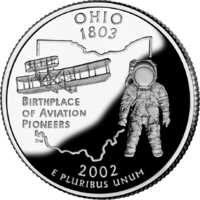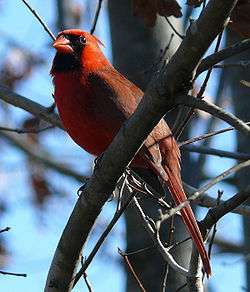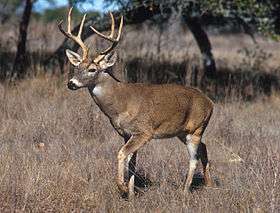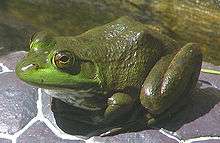List of Ohio state symbols

Ohio, which is also known by its nickname, The Buckeye State, has many official symbols. What follows is a comprehensive list of state symbols of Ohio, each of which is accompanied by a brief description and corresponding facts. The majority of these items are officially recognized by state law, having been ratified by an act of the Ohio General Assembly and executed by the governor's signature. These items can be found in the Ohio Revised Code, General Provisions, Chapter 5. Two of Ohio's official symbols have not been officially signed into law, but were made official through resolution in the Senate.[1]

State motto
Adopted in 1959, the Ohio motto, With God, all things are possible, is a quotation taken from Matthew, 19:26. There was, however, a period from 1865 until 1867 when the motto was: Imperium in Imperio (Latin for "Empire within an Empire"). Too controversial for a post-Civil War society, it was repealed after two years.[2][3]
State slogan

The current official marketing slogan (as of 2008) is: Ohio— Birthplace of Aviation. The reference is to Orville and Wilbur Wright, the inventing duo from Dayton who are credited with building the first successful airplane.[6] A similar version of the slogan appears on Ohio's commemorative state quarter. In the case of the quarter, it reads: Birthplace of aviation pioneers. The addition of pioneers on the quarter's version, denotes space as well as air travel, as Ohio has been the birthplace of 24 NASA astronauts.[7] Ohio's notable astronautical pioneers include: John Glenn, the third human and first American to orbit the Earth; Neil Armstrong, who as a member of the Apollo 11 mission, was the first person to walk on the moon; Jim Lovell, commander of the Apollo 13 mission, and famous for the voice transmission: Houston, we've had a problem; and Judith Resnik, who was killed in the Challenger Disaster on January 28, 1986.[8]
State symbols
| State flag | |||
 |
Main article: Flag of Ohio
Since 1902, the Buckeye State has had a flag unique in design amongst its domestic counterparts. The Ohio swallowtail flag was designed by Cleveland architect John Eisenmann. The flag was first unveiled at the 1901 Pan-American Exposition in Buffalo, a year before it was officially adopted by the Ohio General Assembly.[9][10][11][12] Eisenmann himself explained the flags symbolism:
To commemorate the centennial of the flag In 2002, the General Assembly adopted The Pledge of Allegiance to the Flag of Ohio: I salute the flag of the state of Ohio and pledge to the Buckeye State respect and loyalty.[14] The pledge was designed to be given by Ohio residents following the Pledge of Allegiance.[15] | ||
| State seal | |||
.svg.png) |
Main article: Great Seal of Ohio
While it has been revised several times over the centuries, the Great Seal of Ohio currently features the following device, which closely resembles the design passed into law on March 25, 1803, by the first session of the General Assembly: In the right foreground of the shield a full sheaf of wheat bound and standing erect; in the left foreground, a cluster of seventeen arrows bound in the center and resembling in form the sheaf of wheat; in the background, a representation of Mount Logan, Ross county, as viewed from Adena state memorial; over the mount, a rising sun three-quarters exposed and radiating thirteen rays to represent the thirteen original colonies shining over the first state in the northwest territory, the exterior extremities of which rays form a semicircle; and uniting the background and foreground, a representation of the Scioto river and cultivated fields. The sheaf of wheat represents Ohio's agriculture; the seventeen arrows for Ohio being the seventeenth state admitted into the Union; the sun rising is an allusion to coming wealth and prosperity; the mountains, over which the sun rises, are symbolic of Ohio being the first state west of the Allegheny range.[3] The Great Seal was inspired by the view of the Scioto River Valley from the Adena Mansion, the Chillicothe-area home of Ohio's sixth governor. | ||
| State tree | |||
  |
Main article: Ohio buckeye
The official state tree of Ohio is the Ohio buckeye (Aesculus glabra). Perhaps the earliest example of what can be included as an official state symbol of Ohio was, at least until the mid-20th century, unofficial.[16] Ohio natives have long been referred to as Buckeyes, although the debate on when this exactly began is inconclusive. Historical sources point to at least two instances: the first of these involves Col. Ebenezer Sproat, the first sheriff in the Northwest Territory and Ohio Country in 1788.[17] Sproat was dubbed hetuck (trans: buckeye) by the local Indians, whom he met with in Marietta and was ever after known as buckeye.[18] The second notable occurrence—and arguably the more documented—began around the 1840 election of the one time army commander and eventual ill-fated 9th President of the United States, William Henry Harrison. Whig convention delegates for Harrison adorned themselves with various buckeye paraphernalia, which Harrison had chosen as his symbol.[18] The buckeye had also been the athletic nickname of the state's largest public university for decades before a 1953 act of the Ohio General Assembly recognized the Ohio buckeye as the official state tree. | ||
| State flower | |||
 |
Cultivated flower The state flower of Ohio is the scarlet carnation. On February 3, 1904, the Ohio General Assembly passed a resolution providing for a state flower to be chosen. The act naming the Carnation as the state flower specified the scarlet carnation for the memory of William McKinley.[19] McKinley, who was assassinated in 1901, was one of seven presidents born in Ohio. He was reported to have always worn a scarlet carnation in his lapel for good luck, after having received one—from his opponent—during his campaign for the U.S. House of Representatives. He won the election, and wore a carnation thereafter.[20] | ||
 Large white trillium (Trillium grandiflorum) |
Wildflower
The state wildflower of Ohio is the large white trillium (Trillium grandiflorum). In 1982, the Native Plant Society of Northeastern Ohio assembled with a goal of nominating and selecting a flower that was "native" to Ohio to unseat the scarlet carnation. On April 26th, 1983, the group selected the large white trillium to take on the role as state wildflower, which they brought to state representatives in 1984. A year later, State Representative Bob Clark, a member of the House Natural Resources Committee, sponsored a bill to name the large white trillium the official state wildflower of Ohio, leading the scarlet carnation as state flower. Trillium was chosen by the Society because it was present in all 88 counties of Ohio, could be easily recognized, and was not endangered. | ||
| State bird | |||
 Cardinal (C. cardinalis) Cardinal (C. cardinalis) |
Ohio's state bird, the cardinal (C. cardinalis), was designated the state bird by the General Assembly in 1933.[21] It was then listed as effective in the Ohio Revised Code in 1953.[22] | ||
| State animal | |||
 State animal – white-tailed deer |
The white-tailed deer (O. virginianus) became the official state wild animal in 1988.[23] | ||
| State reptile | |||
 |
The black racer became the state reptile in 1995.[24] | ||
| State amphibian | |||
 |
The spotted salamander was made the state amphibian in 2010.[25] | ||
| State frog | |||
 |
The American bullfrog was made the state frog in 2010.[26] | ||
| State insect | |||
 |
7-spot ladybug, Coccinella septempunctata
The insect known as the 7-spot ladybug (or lady beetle), Coccinella septempunctata, was designated as the official state insect by Senate Concurrent Resolution 14, 111th General Assembly, 1975–1976 Session.[27] It was designated Ohio's official insect by Public Chapter 896 of the 99th General Assembly. It is a species from Europe, and not native to North America. |
||
| State fossil | |||
 |
The Isotelus maximus trilobite became the official state invertebrate fossil in 1985.[28] | ||
| State gemstone | |||
 |
Ohio flint became the official state gem stone in 1965.[29] | ||
| State prehistoric monument | |||
 |
Main article: Newark Earthworks
The Newark Earthworks became the official state prehistoric monument in 2006 by §5.073 of the Ohio Revised code.[30] |
||
| State fruits | |||
  |
Fruit Tomatoes became the state fruit in 2009. Native fruit |
||
| State beverage | |||
 |
Tomato juice became the state beverage through a bill passed in 1965.[32] | ||
| Groundhog | |||
 |
Ohio's official groundhog is named Buckeye Chuck.[33] | ||
| U.S. ship | |||
 |
The USS Ohio is a ballistic missile submarine, which is not only the name of the ship, but the official name of the class of submarine as well. |
State songs
Ohio's official songs include:

"Beautiful Ohio", by Ballard MacDonald (lyrics) and Mary Earl (music), was adopted as the official state song in 1989.[34]

"Hang on Sloopy", by Wes Farrell and Bert Russell, is the state's official rock song, adopted by the General Assembly in 1985.[35] The song was never signed into law, but was enacted through House Concurrent Resolution 16, 116th General Assembly, 1985–1986 Session.[36]
Miscellaneous symbols
| Carnation City | ||
| |
Main article: Alliance, Ohio
In 1959, the General Assembly named Alliance the "Carnation City" of Ohio.[37] |
|
| Bicentennial Bridge | ||
 |
Main article: Blaine Hill "S" Bridge
The Blaine Hill Bridge in Belmont County, which was constructed in 1828 as part of the National Road, is the oldest bridge in the state. It was named the state bicentennial bridge in 2002.[38] |
See also
Citations & references
- All listed codes (§) are from the General Provisions of the Ohio Revised Code unless otherwise stated. Retrieved in March 2008.
- ↑ Official Symbols of Ohio not signed into law
- ↑ Ohio Fact Sheet
- 1 2 History of the Great Seal of Ohio
- ↑ "New Ohio Pride License Plate". Ohio Bureau of Motor Vehicles. 2012. Retrieved 2012-08-15.
- ↑ Luce, Lacey (2011-11-28). "CCAD, Governor Unveil New Ohio License Plate Design". Retrieved 2012-09-30.
- ↑ "Smithsonian Institution, "The Wright Brothers & The Invention of the Aerial Age"".
Johnson, Mary Ann (2001). "On the Aviation Trail in the Wright Brothers' West Side Neighborhood in Dayton, Ohio". Wright State University.
"BBC News: Flying through the ages". March 19, 1999. Retrieved January 6, 2010. - ↑ Ohio Astronauts at Nasa.gov
- ↑ "The 51-L Crew: Judy Resnick". The Challenger Center.
- ↑ History of the Flag of Ohio
- ↑ Flags of the Fifty States – Ohio
- ↑ Sarah's Scrapbook
- ↑ "Ohio's Flag". Ō•HI′•Ō Defined (4th ed.). Columbus, Ohio: Ohio Secretary of State and Ohio Public Library Information Network (OPLIN). 2006.
- ↑ Ohio State Flag
- ↑ §5.013
- ↑ Ohio State Pledge
- ↑ The Buckeye Tree
- ↑ Ohio Sheriffs
- 1 2 Origins of the Buckeye name
- ↑ § 5.02
- ↑ Ohio Facts at Wright State University
- ↑ Ohio State Bird at Ohio History Central
- ↑ §5.03
- ↑ §5.032
- ↑ §5.031
- ↑
- ↑
- ↑ History of Ladybug as Ohio state insect
- ↑ §5.071
- ↑ §5.07
- ↑ §5.073
- ↑
- ↑ §5.08
- ↑ Buckeye Chuck at Ohio HIstory Central
- ↑ §5.09
- ↑ Ohio's Rock Song
- ↑ Ohio Rock Song
- ↑ Dr. Lamborn's Carnations Archived February 4, 2007, at the Wayback Machine.
- ↑ §5.072